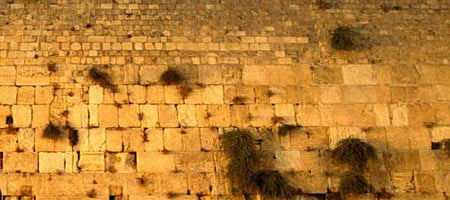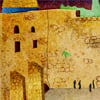"So, have you ever killed somebody?"
This was probably the first army-related question I was asked by my Taglit-Birthright Israel Mayanot, most of them from the University of Pennsylvania and accompanied by Rabbi Levi Haskelevich. It was asked amid clouds of Golan Heights dust as we were driving through the rocky terrain on a mini-4WD.
The landscape was supposed to be familiar to me: School fieldtrips have taken me several times to these green-and-black mountains, this feather-clouded sky and these golden fields of swaying briars and wild wheat.
And yet, there was something more to this view. This time I was beholding my land with more than my own eyes. Beside me were young sons and daughters of Israel who could have had the same experiences, but had been deprived from these sights so far. My mission was to help them experience to the fullest over the course of five days what they had been missing for 20 years. And through trying to do so, I found myself seeing our homeland as if it had just been handed to us in wrapping paper.
Prior to this trip, my own discoveries were endless, from a peaceful settlement that was the very frontline of the Second Lebanon War to the pleasure of rubbing myself black with Dead Sea mud. Some of these wonders may have been too accessible to be appreciated, but seeing these young men and women get excited about them made me think, "Hey, I've got a wonderful country. I'm so lucky to live here." This was what I tried to convey to my guests.
Many dived into the invitation to explore and discover from the very beginning, endlessly asking about everything they saw and heard through the journey. I realized that my answer to each question would design their fundamental knowledge and opinion of something; that they would take home whatever I told them about the army life, about the Palestinians, about Israeli society and about everything they hadn't seen yet.
I could see in the eyes of Danielle, Matt, Jessica and Zach that they would come back to see all these things for themselves, that they will climb Masada on foot by sunrise because I promised them that they couldn't fully experience it if they just rode the cable car. They would walk the Negev desert and spread a sleeping bag under the stars because I told them that no sky is prettier. They would decisively, doubtlessly, grasp the stones of the Western Wall and say, "This is mine. This is home."
Usually, I approach the Western Wall and cry without knowing why. But this time, with the birthright girls beside me and the boys wrapping tefillin over in the men's section, I couldn't shed a tear. Suddenly I realized that before, I had been crying out of the fear that our possession of this mighty wall was fragile and temporary. But with Sarah, Adam, Halley and Mike behind me, I felt that our rightful hold of this land would extend far into the future, just as it extends deep into the dawn of history. If Israel brings them here and presents this controversial piece of earth as ours, they will grow up knowing that it's ours and theirs, and will give their hearts for it.
At the Military Cemetery on Jerusalem's Mount Herzl, I walked beside them and read out the gravestones' Hebrew inscriptions of rank, name and birthplace. They nodded thoughtfully over each detail. Some of them cried over those faceless soldiers about which the poet Nathan Alterman had written: "And when you ask us, ‘Who are you?' we will say, ‘We are the silver tray, upon which this country was served to you.' "
When it was time for each of them to choose his or her most memorable moment, almost everyone chose the walk through the cemetery. I looked around the huge circle of which I was a part, seated on an overlook on Jerusalem's Mount Scopus in the freezing cold and said, "Hi. My name is Li-Or. My most memorable moment is now, when 40 Americans freezing to death are telling me that their most memorable moment was in a military cemetery where my comrades, not theirs, are buried."
I hope that through this journey they have learned that my comrades are the silver tray for us all.
I hope they realized how amazing it is to remove the curtain from the bus window and see the view on the road, and that they now appreciate every time they stop while climbing up a mountain to take a deep breath and look around.
Above all, I hope they now know that they and their children will always be welcome.








Start a Discussion